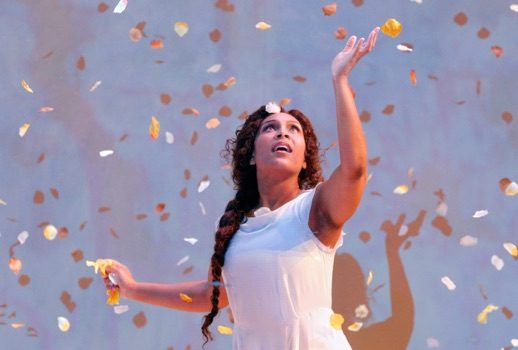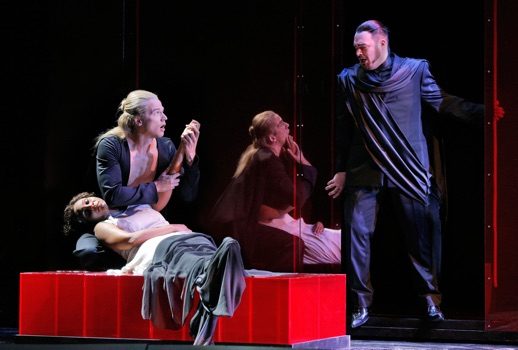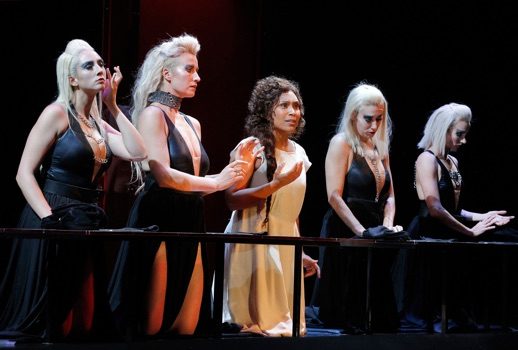
On Sunday James Darrah’s often riveting production featured a radiant, devastating Talise Trevigne as its impossibly innocent heroine and made an intriguing case for this ravishing if baffling work.
Since they share a librettist (Luigi Illica) and a Japanese locale, Iris is frequently mentioned in connection to Puccini’s Madama Butterfly, written six years later, but the latter’s simpler, more moving story no doubt accounts for its long-standing popularity.
Mascagni’s Iris lives with her blind father apart from the world. She delights in nature, particularly her burgeoning garden and the sun, for her the source of all these simple and finest things in life. Her singular beauty attracts the attentions of Kyoto, a ruthless pimp, and one of his regular clients Osaka, a young rake. Hoping to distract Iris, they stage a puppet show during which they kidnap her and deposit her in Kyoto’s brothel.
Absolutely unaware of the ways of the world, Iris awakens and unable to make sense of her surroundings imagines that she has died and is now in paradise. Osaka arrives and his passionate attempts at seduction are met with implacable resistance. He flees and an outraged Kyoto resolves to place Iris for sale to the highest bidder.
Her father, sure that she has willingly abandoned him to enjoy the world’s temptations, arrives and violently denounces her. In absolute despair, Iris throws herself down an open sewer. Initially questioning how she came to this sorry state, she soon comes to accept that her imminent death will result in the birth of more flowers brought forth by the all-powerful sun.
The celebrated choral opening of the opera, the spectacular “Inno del Sole” threatens to overwhelm poor Iris’s humble story before it begins. Eventually we realize that the chorus serves as the key to this eccentrically opaque character.

Cowering on the floor traumatized by Osaka’s suit, Trevigne skillfully balanced Iris’s trauma with her blind commitment to her innocent world view. She beautifully negotiated the pure innocence of Iris while allowing us to become occasionally frustrated with her stubbornness. She was particularly arresting in Iris’s wrenching existential encounters in the sewer with her father and Osaka and Kyoto.
Although her warmly shining soprano took a while to warm up—the middle often disappeared during the first act—she soared expressively above the staff where her tight vibrato excitingly throbbed with confused emotion.
Gerard Schneider as Osaka also began in rough voice, his throbbing tenor often alarmingly hoarse. He settled down in the second act and his attempted seduction of Iris often rang out impressively. Unfortunately his disturbingly over sung performance showed little concern for dynamic nuance. Although Douglas Williams strutted about provocatively as the vicious pimp, he too struggled with part a size or two too big for his mellow baritone.
As Il Cieco Matthew Boehler was gratefully cast and sang well, although this promising young bass lacked the gravitas that might been brought to the role by a more experienced singer. Mezzo Cecelia Hall gracefully negotiated the vocal and awkward choreographic demands of the geisha who dominates the first-act puppet play.

The red lacquer “sex cabins” that dotted the second act set were particularly effective. Unfortunately many of Peabody Southwell’s grim costumes were eye-poppingly hideous, particularly Kyoto’s outrageous “hostess pajamas,” and the many be-sequined denizens of his brothel who looked as if they had stepped out of a wisely discarded episode of 1960s vintage Star Trek.
Generally considerate to his hard-working singers, Botstein drew loudly vigorous playing from the American Symphony Orchestra but as usual his conducting veered to the bombastic particularly in his full-bore, nearly deafening renditions of the choruses to the sun that begin and end the work.
In its early years Iris attracted the greatest singers of the day—the world premiere starred Hariclea Darclée and Fernando De Lucia—but for all its frequently gorgeous music, Illica’s curiously uninvolving libretto must account for why Iris is so infrequently performed, absent from the Met for 85 years. In the quarter-century it was performed there it managed only16 performances, despite casts that included Emma Eames, Lucrezia Bori, Elisabeth Rethberg, Enrico Caruso, Beniamino Gigli, Antonio Scotti and Ezio Pinza.
Since then such widely varied divas as Clara Petrella, Magda Olivero, Adriana Maliponte, and Olivia Stapp have taken on Mascagni’s innocent in the odd revival. But perhaps Iris’s fortunes are changing—tomorrow (26 July) in a concert performance in Montpellier Bulgarian soprano Sonya Yoncheva sings the title role for the first time, conducted by her husband Domingo Hindoyan.
In the meantime three more performances remain during Summerscape, and Trevigne’s glowing performance is more than enough to make the trip to Annandale-on-Hudson for Iris worthwhile.



